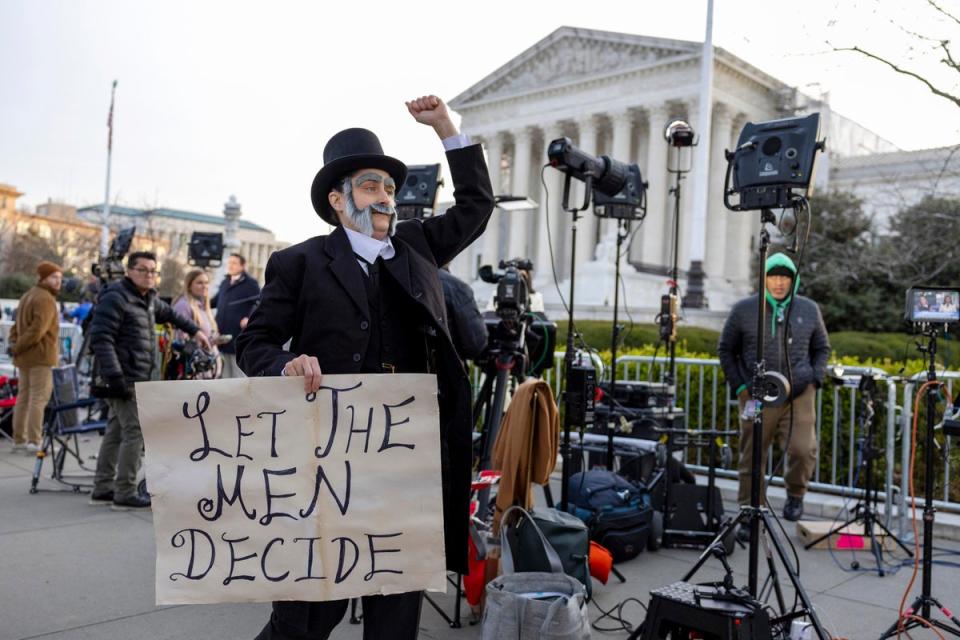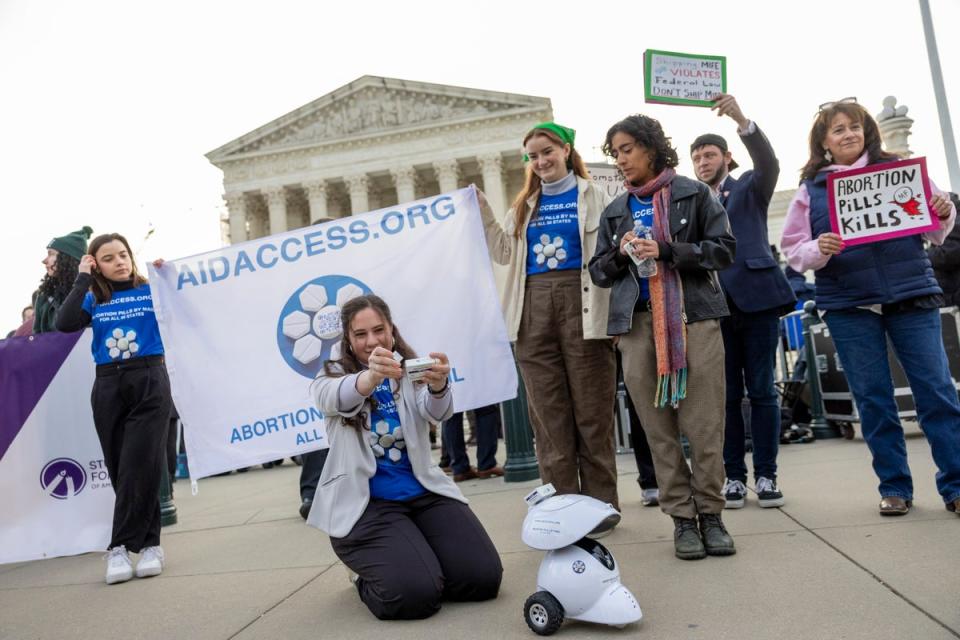Clarence Thomas and Samuel Alito dust off 150-year-old Comstock Act to target abortion rights
- Oops!Something went wrong.Please try again later.
- Oops!Something went wrong.Please try again later.
The US Supreme Court appears unlikely to agree with anti-abortion activists who want to overturn the federal government’s approval of a widely used abortion drug, a proposal that could have profound and far-reaching consequences for millions of Americans’ healthcare.
A majority of justices on the nine-member court on Tuesday were sceptical that a group of anti-abortion doctors have sufficient legal grounds to bring the case against the US Food and Drug Administration, which first approved the drug mifepristone in the year 2000.
But during Tuesday’s oral arguments in a case targeting the drug, at least two conservative justices floated the idea of dusting off a 151-year-old law that abortion rights advocates fear could be used to further strip access in the aftermath of the Supreme Court’s 2022 decision to revoke Americans’ constitutional right to abortion care.
The Comstock Act of 1873 targeted the mailing of contraceptives, pornography and any drug “intended for producing abortion, or for any indecent or immoral use.” It largely floundered under a series of congressional actions and the Supreme Court’s ruling in Roe v Wade 100 years later, but anti-abortion activists – as well as a federal judge who agreed to ban mifepristone, triggering the latest Supreme Court battle – have invoked the law following a decades-long anti-abortion crusade from conservative Christian legal groups.
A case before the Supreme Court argues that the FDA wrongfully approved mifepristone for use up to 10 weeks of pregnancy, and then improperly eliminated requirements that the drug should only be dispensed in person.
On Tuesday, Supreme Court Justice Samuel Alito – who wrote the 2022 decision to overturn Roe v Wade – suggested that the FDA should have “considered” Comstock.
Justice Clarence Thomas later suggested that the manufacturer of the mifepristone drug Mifeprex may have “a Comstock problem.” He said it “specifically covers drugs such as yours.”

Erin Hawley, senior counsel for Alliance Defending Freedom, the conservative Christian legal group leading the Supreme Court challenge, also argued to the justices that the Comstock Act prohibits abortion drugs by mail.
In 2022, the US Department of Justice clarified that the Comstock Act does not apply to mailing mifepristone or misoprostol, the drugs used for the two-drug protocol for a medication abortion, a procedure that accounts for nearly two-thirds of all abortions in the US.
A right-wing special interest group-led proposal for Donald Trump’s potential return to the White House also cites Comstock to block mifepristone access and other abortion care by mail, and to criminally prosecute providers and the people who receive it.
Dozens of Republican members of Congress have also written to the Supreme Court to argue that Comstock bans abortion drugs altogether.
The Supreme Court is likely to issue a decision on the mifepristone case later this spring.
Even if the court rejects the challenge from anti-abortion activists, two years after the landmark decision in Dobbs v Jackson Women’s Health Organization, medication abortion will still be illegal in more than a dozen states that have imposed effective bans on abortion care altogether.
Stripping access to abortion drugs would ‘inflict grave harm’
In November 2022, Alliance Defending Freedom filed a federal lawsuit targeting mifepristone from Amarillo, Texas on behalf of a group of anti-abortion physicians incorporated as the Alliance for Hippocratic Medicine, which was organised that same month with an address in Amarillo.
US District Judge Matthew Kacsmaryk – who was appointed by Donald Trump – later issued the ruling to suspend the FDA’s approval of the drug, triggering appeals that were kicked up to the nation’s highest court.
Revoking the FDA’s approval of mifepristone would “severely disrupt” the government’s drug approval process and regulatory authority and “inflict grave harm on women across the nation,” according to US Solicitor General Elizabeth Prelogar.
“Some women could be forced to undergo more invasive surgical abortions. Others might not be able to access the drug at all,” she told the justices on Tuesday.
She urged justices to reject that “profoundly inequitable result.”
Jessica Ellsworth, an attorney representing Mifeprex manufacturer Danco Laboratories, pointed out that Judge Kacsmaryk’s decision relied on debunked and retracted medical studies, underscoring that ideologically driven courtrooms are ill-equipped to handle major medical decisions.
Medical experts provided hundreds of pages of research and clinical studies affirming the safety and efficacy of abortion drugs, and “courts are just not in the position to parse through and second guess that,” Ms Ellsworth said.
“I think this court should think hard about the mischief it would invite if it allowed agencies to start taking action based on statutory responsibilities that Congress has assigned to other agencies,” she added.

President Joe Biden’s administration and others have also warned that a Supreme Court decision that targets the FDA’s approval process could open the door for other right-wing-fuelled legal challenges to other drugs, including HIV prevention medication, gender-affirming care, contraception and Covid-19 vaccines.
In a statement following Tuesday’s hearing, Ms Ellsworth added that “second-guessing the scientific and data-driven judgments of an independent expert agency is an extreme position that could inject further uncertainty across American life.”
‘Turning a small lawsuit into a nationwide legislative assembly’
Most of Tuesday’s arguments did not focus on the far-reaching implications that targeting the FDA approval process would have for both the pharmaceutical industry and people who depend on prescription drugs, but on whether the anti-abortion doctors who launched the complaint have any legal standing to do so.
At one point, Justice Elena Kagan grilled Ms Hawley to show who, exactly, was injured by the FDA’s approval of the drug.
“You need a person,” she said. “So who’s your person?”
Conservative Justice Neil Gorsuch, one of three justices appointed to the court by Donald Trump, appeared to condemn Judge Kacsmaryk’s decision, casting it among “rash” lower-court decisions with overly broad consequences.
He questioned why litigation from a handful of anti-abortion doctors is “turning what could be a small lawsuit into a nationwide legislative assembly on an FDA rule.”
Justice Ketanji Brown Jackson criticised the apparent “mismatch” between the injury claimed by anti-abortion doctors and the remedy they seek.
Federal law already grants anti-abortion doctors so-called “conscience objections” from providing abortion care, but they now are presenting a case that would deny “anyone from having access to these drugs at all,” Justice Jackson added. “How they can be entitled to that?”
In her closing remarks, Ms Prelogar noted the “striking anomaly of the nationwide nature of this remedy.”
“The problem here is they sued the FDA. The FDA has nothing to do with the conscience protections. That’s all happening downstream at the hospital administration level,” she said.
“They fear that there might be some emergency room doctor somewhere, someday, who might be presented with some woman who is suffering an incredibly rare complication and that the doctor might have to provide treatment, notwithstanding the conscience protections,” she added.
But to mitigate that hypothetical risk, anti-abortion activists propose “sweeping nationwide relief that restricts access to mifepristone for every single woman in this country, and that causes profound harm,” she said.

